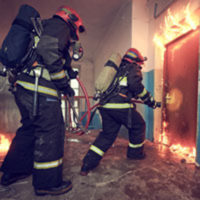MENU
- Home
- Overview
- Attorneys
- Practice Areas
- Firm News
- Blog
- Contact
 Cancer diagnosis rates among firefighters has become a disturbing trend. A multi-year study by the National Institute for Occupational Safety and Health (NIOSH) recently found that firefighters have a 14 percent greater risk of dying from cancer and double the chance of having testicular cancer or mesothelioma, compared to the general public.
Cancer diagnosis rates among firefighters has become a disturbing trend. A multi-year study by the National Institute for Occupational Safety and Health (NIOSH) recently found that firefighters have a 14 percent greater risk of dying from cancer and double the chance of having testicular cancer or mesothelioma, compared to the general public.
The International Association of Fire Chiefs and the National Volunteer Fire Council have come together to present Firefighter Safety Stand Down week on June 16 to 22. Both organizations recently issued the Lavender Ribbon Report, which provides a series of best practices that, if followed, are expected to reduce risk of cancer among firefighters.
The danger of exposure to cancer-causing materials comes from both the building materials and the gear worn to fight the fires. Exposure to contaminants in the air from combustion products is well known. Recently, firefighting gear and foam have been recognized as potential likely sources of exposure to carcinogens. Turn out pants are typically made using perfluorooctanoic acid (PFOA), as it has useful water repellent properties. PFOA and similar compounds have been implicated as carcinogenic. There is no known safe alternative for making turnout gear at a reasonable cost.
Helpful tips for firefighters in the Lavender Ribbon Report include the following:
Firefighters and other first responders are urged to pause their non-emergency activities during Firefighter Safety Stand Down week and educate themselves on reducing cancer risks through implementing best practices. The Firefighter Cancer Registry Act has been established to help develop data on firefighters’ risk of cancer. First responders are encouraged to report exposure information to the national registry.
If you are a first responder that was injured at work, you may be entitled to Workers’ Compensation benefits to help with medical costs. We will help secure the maximum compensation you are entitled. Call us today at 302-656-5445 or complete an online form to speak to an experienced Wilmington Workers’ Compensation lawyer and Jacobs & Crumplar, P.A. Located in Wilmington and Georgetown, Delaware, we serve clients throughout Dover, New Castle County, and Sussex County.